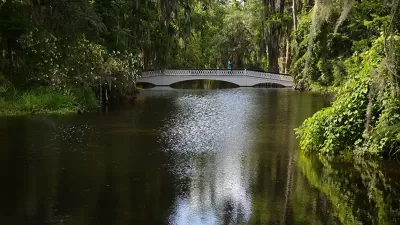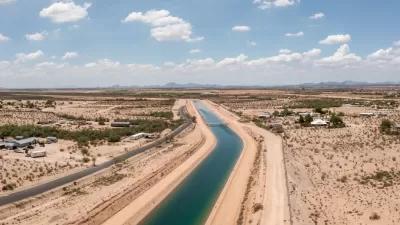A political battle over a large withdrawal of water for use by a Google server farm has one reporter deploying words like "war" and "free-for-all" to tell the story.

"Water wars" are erupting in South Carolina, according to an article by Bo Petersen, exacerbated by large water withdrawals by companies like Google.
"Forty million gallons of surface water per day now are pumped to customers by the Berkeley Water and Sanitation utility," according to Petersen. "Google, the marquee computer network company, apparently uses one-tenth of it — about 4 million gallons — to cool the servers at its only South Carolina data center, in Goose Creek."
A planned expansion of the server facility would require even more water—1.5 million gallons a day from a coastal aquifer. If permitted, Google would become the third largest aquifer user in the three-county Charleston region.
Opponents of Google's plan for the aquifer include local residents, water utility officials, and conservationists. How the battle plays out could set a precedent for the growing region that is only beginning to come to the grips with the environmental consequences of its growth. The article dives into the situation in South Carolina in detail, referencing similar situations in nearby states. South Carolina and other nearby states are "tightening regulations surrounding surface water withdrawal," according to Petersen, in response to decades of intermittent drought, warming temperatures, and growing residential and commercial demands.
FULL STORY: Google's controversial groundwater withdrawal sparks question of who owns South Carolina water

Planetizen Federal Action Tracker
A weekly monitor of how Trump’s orders and actions are impacting planners and planning in America.

Maui's Vacation Rental Debate Turns Ugly
Verbal attacks, misinformation campaigns and fistfights plague a high-stakes debate to convert thousands of vacation rentals into long-term housing.

San Francisco Suspends Traffic Calming Amidst Record Deaths
Citing “a challenging fiscal landscape,” the city will cease the program on the heels of 42 traffic deaths, including 24 pedestrians.

Defunct Pittsburgh Power Plant to Become Residential Tower
A decommissioned steam heat plant will be redeveloped into almost 100 affordable housing units.

Trump Prompts Restructuring of Transportation Research Board in “Unprecedented Overreach”
The TRB has eliminated more than half of its committees including those focused on climate, equity, and cities.

Amtrak Rolls Out New Orleans to Alabama “Mardi Gras” Train
The new service will operate morning and evening departures between Mobile and New Orleans.
Urban Design for Planners 1: Software Tools
This six-course series explores essential urban design concepts using open source software and equips planners with the tools they need to participate fully in the urban design process.
Planning for Universal Design
Learn the tools for implementing Universal Design in planning regulations.
Heyer Gruel & Associates PA
JM Goldson LLC
Custer County Colorado
City of Camden Redevelopment Agency
City of Astoria
Transportation Research & Education Center (TREC) at Portland State University
Jefferson Parish Government
Camden Redevelopment Agency
City of Claremont





























